ATLANTIS – In a stark illustration of the devastating impact of climate change, the rising sea levels have forced entire communities to relocate, creating a new wave of climate refugees and redefining national borders. The city of Atlantis, once a bustling coastal metropolis, now finds itself grappling with the profound social and geopolitical implications of this environmental crisis.
Atlantis, with its low-lying geography, has been particularly vulnerable to the effects of climate change. Over the past decade, the city’s protective barriers and flood defenses have been overwhelmed by relentless sea-level rise and increasingly severe storms. The tipping point came when a series of unprecedented storm surges breached the city’s defenses, leaving large parts of Atlantis submerged.
“The situation reached a critical point where it was no longer feasible for us to maintain our homes and livelihoods here,” said Mayor Claudia Garcia. “We had to make the difficult decision to relocate our residents to safer areas.”
The mass exodus from Atlantis has created a significant influx of climate refugees in neighboring regions. Countries and cities previously considered safe havens are now grappling with the challenges of accommodating these displaced populations. The strain on resources, infrastructure, and social services is immense, prompting urgent international collaboration and support.
Dr. Armand Leduc, a climate scientist at the Global Institute for Environmental Research, highlighted the broader implications of Atlantis’s plight. “What we’re witnessing in Atlantis is just the beginning. As sea levels continue to rise, we can expect to see more cities and communities facing similar fates. This will fundamentally alter global demographics and national borders.”
The influx of climate refugees has also sparked debates on the legal and ethical responsibilities of nations. Traditional definitions of refugees, which focus on conflict and persecution, are being challenged by this new category of climate-induced displacement. International bodies are working to develop frameworks that recognize and protect the rights of climate refugees.
“Climate change is a global problem that requires global solutions,” said Dr. Leduc. “We need to establish international protocols to ensure that climate refugees are treated with dignity and receive the support they need.”
Despite the challenges, there are stories of resilience and hope emerging from Atlantis. Many former residents have found new beginnings in host communities, where local governments and organizations are working tirelessly to provide housing, employment, and education. Innovative solutions, such as floating neighborhoods and adaptive architecture, are being explored to offer more sustainable living conditions for displaced populations.
One such initiative is the New Atlantis Project, a collaborative effort between architects, engineers, and environmentalists to create a floating city that can withstand rising sea levels. This ambitious project aims to provide a permanent solution for climate refugees, offering a model for future urban development in an era of climate uncertainty.
“The New Atlantis Project represents a beacon of hope,” said Mayor Garcia. “It shows that with creativity, collaboration, and determination, we can adapt to the challenges posed by climate change and build a more resilient future.”
As the world grapples with the realities of climate change, the story of Atlantis serves as a poignant reminder of the urgent need for action. It underscores the interconnectedness of our global community and the shared responsibility to address the environmental crises that transcend borders.
The displaced residents of Atlantis, though faced with immense hardship, embody the spirit of resilience and adaptation. Their journey highlights the critical importance of proactive measures and international cooperation in mitigating the impacts of climate change and ensuring a sustainable future for all.

